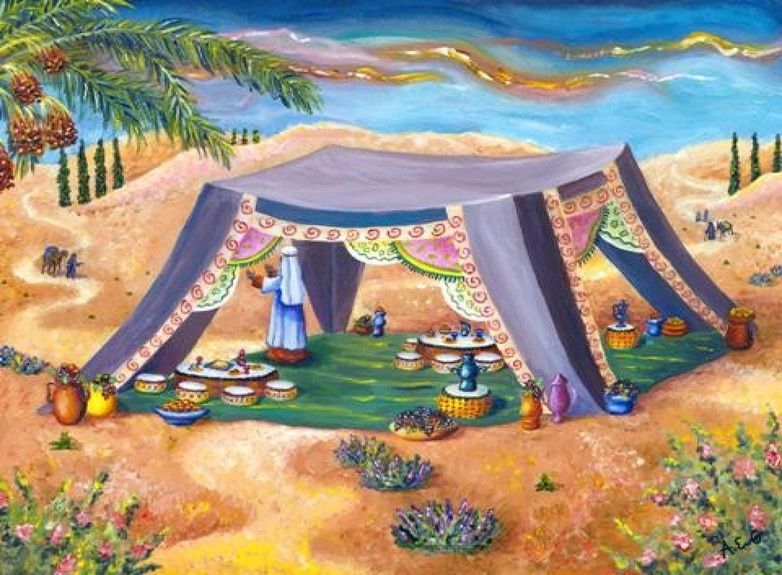- In his commentary, both on this and on the previous Parasha, Rashi quotes Midrashim which suggest that Avraham questioned the importance of the circumcision and whether it is necessary. There is nothing in the text to support it, and it would be safe to assume that the authors of the Midrash responded to a contemporary crisis. That crisis was a result of the encounter with Hellenism, which worshipped the perfection of the body and opposed circumcision.
- The root לקח – to take, appears four time in the encounter of Avraham with his visitors (18:4; 5; 7; 8). The root עבר – to pass, is mentioned three times (18:3; twice in 18:5). Is there a special message here? Could this be tied to Jos. 24:3 – ואקח את אברהם אביכם מעבר הנהר?
- How did Avraham serve the butter, milk, and meat? There are three main options: a. first the butter and milk and then the meat, observing rabbinical standards; b. side by side, observing, or at least not contradicting, biblical standards; c. cooked together.
- In 18:19 we are told why God chose Avraham. He has the combination of צדקה ומשפט, which can be translated as compassionate justice, and he is an educator. Avraham thus become the prototype of a spiritual leader who acts correctly and inspires others to do the same.
- In that verse there is a transition from God speaking in first person to being referred to in the third person.
- Avraham argues for saving the cities with a minimum of ten righteous people in the five cities. Is it possible that he suggests that there should be at least two Tzaddikim per city because one alone would be overwhelmed by the wickedness of the city instead of positively influencing its inhabitants?
- Three men leave Avraham but only two arrive at Sodom, and they are referred to as מלאכים, messengers, or as some would translate – angels.
- Speaking of angels, the word מלאך is mentioned in the bible 197 times. 84 of those occurrences speak of מלאכים sent by humans. In the other 113 times,מלאך sometimes appear independently and sometimes in a construct, such as מלאך אלקים, מלאך ה’ and the singular terms מלאך הברית, מלאך פניו. There are three negative constructs, all in Proverbs (13:17; 16:14; 17:11), and all referring to humans. The most famous names associated with angels, Michael and Gabriel, appear in the Bible only five times in the connotation of a divine being, all in the book of Daniel (8:16; 9:21; 10:13; 10:21; 12:1), and they are not called מלאכים. Raphael appears only once as a human name. All this suggests that the original biblical concept of angels was that of temporary messengers, and not eternal beings with an identity and a name.
- In 19:3 Lot bakes Matzot not because it was Pesah, but because this is what one bakes when there is no time. Though we are used to think that the dough rises within 18 minutes, it needs around 26 hours to become leavened, and the secret of starter dough was not widespread in the ancient world.
- The sin of Sodom was not sodomy but rather being inhospitable and unsupportive of the needy, as it is clearly stated in Ezekiel (16:49).
- The reason for the confusion is that the people of Sodom wanted to “know” the visitors, but it should be interpreted as an act of humiliation which was meant to deter foreigners from visiting the city. The proof is that when Lot refuses to grant the mob’s request, they say that they will harm him more than they were going to harm the guests (19:9).
- When Lot tried to tell his sons-in-law that Sodom is going to be destroyed, they did not believe him. It could be that altruism was unknown in Sodom, so they thought that he is trying to embezzle them. That must have been very shocking to Lot.
- When Lot’s wife looked back, she turned into a pillar of salt. Did she feel superior to those left behind and was punished for her arrogance, or did she feel sorry for her family and friend and was immortalized in salt to remain there as a guardian?
- When Sarah asks Avraham to send Hagar and Ishmael away, God tells him to listen to her. Is it possible that God is telling Avraham that this will be better for Ishmael than staying in an abusive household?
- How old was Yitzhak at the time of the Akedah? Ibn Ezra says that he was thirteen or fourteen years old, and there is nothing in the text to support the argument that he was older than that. In fact, he was probably younger.
- How can Avraham justify not telling Sarah about the Akedah?
Enjoy reading and learning
Shabbat Shalom
Rabbi Haim Ovadia








